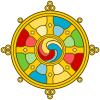

| Part of a series on |
| Tibetan Buddhism |
|---|
 |
The Tibetan Buddhist canon is a compilation of the Buddhist sacred texts recognized by various schools of Tibetan Buddhism. The Canon includes the Kangyur, which is the Buddha's recorded teachings, and the Tengyur, which is commentaries by great masters on the Buddha's recorded teachings. The first translation into Tibetan of these manuscripts occurred in the 8th century and is referred to as the Ancient Translation School of the Nyingmas.
The Tibetan Canon underwent another compilation in the 14th century by Buton Rinchen Drub (1290–1364). Again, the Tibetans divided the Buddhist texts into two broad categories:
- Kangyur (Wylie: bka'-'gyur) or "Translated Words or Vacana", consists of works to have been said by the Buddha himself. All texts presumably have a Sanskrit original, although in many cases the Tibetan text was translated from Pali, Chinese, or other languages.
- Tengyur (Wylie: bstan-'gyur) or "Translated Treatises or Shastras", is the section to which were assigned commentaries, treatises and abhidharma works (both Mahayana and non-Mahayana). The Tengyur contains 3626 texts in 224 Volumes.
The Canon includes all of the Buddha's teachings and the commentaries on all three Buddhist vehicles (yanas): Hinayana (Theravada), Mahayana (Sutra), and Vajrayana (Tantra).
In addition to sutrayana texts from Early Buddhist schools (mostly Sarvastivada) and Mahayana sources, the Tibetan canon includes tantric texts.[1]
- ^ Tibetan: rgyud. The distinction between sutra and tantra is not rigid. For example, in some editions the tantra section includes the Heart Sutra (Cf. Conze, The Prajnaparamita Literature, Mouton, the Hague, 1960, page 72.) and even versions of texts in the Pāli Canon (Mahasutras, Peter Skilling, Pali Text Society, volume I, page xxiv. The abbreviation DN there is given in the author's list, page xv, as Digha Nikaya, which is part of the Pali Canon.)